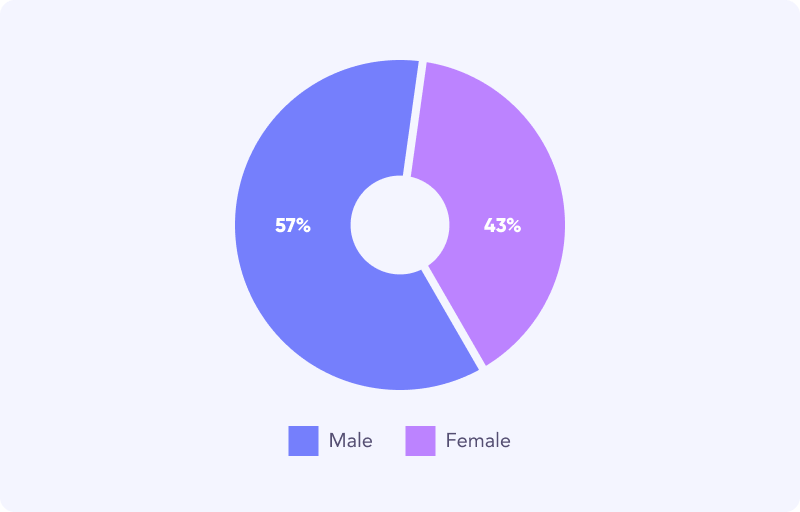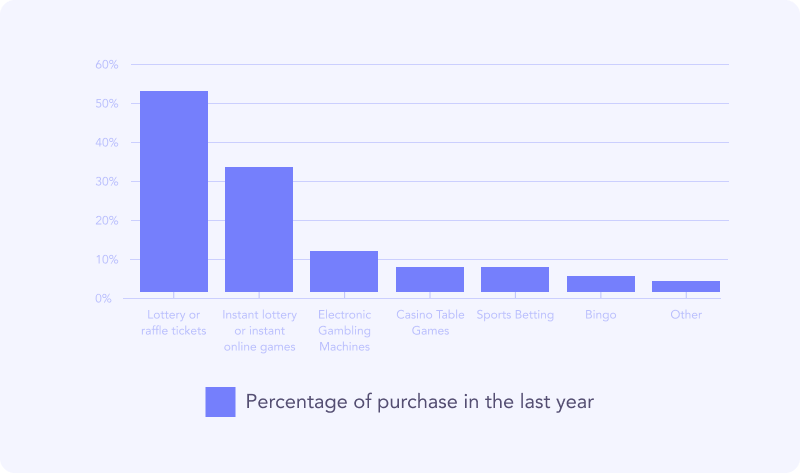Canada Gambling Statistics
Gambling is thrilling, whether online or at the casino, so that it’s easy to forget that it’s a huge worldwide business. While it won’t help you win at the tables, it’s interesting to see how Canadians fit into this global picture. On this page, we’ll be diving into some statistics associated with Canadian gambling activity.
The Most Important Gambling Statistics for Canada
Around 60% of all Canadians gamble at least once annually.
Lottery and raffle tickets constitute most of the gambling industry in Canada.
Among Canadians, the age bracket of most-active gamblers is 45 to 64.
The average Canadian gambler spends up to $500 per year on the activity.
Less than 2% of Canadians are at risk of problem gambling.
The size of the Canadian gambling market has fallen by more than 15% since the beginning of the pandemic.
Gambling Industry in Canada vs Worldwide
Given everything that’s been going on over the past couple of years – the pandemic, rising inflation, and the increased cost of living – it shouldn’t be shocking that the gambling industry in Canada, and in the rest of the world, has changed significantly.
First off, due to the long closure of brick-and-mortar casinos and sportsbooks, we’ve seen a rise in the number of people gambling online. However, we’ve also seen a downturn in the overall value of the gambling market in Canada. Gambling, it would seem, is a luxury that many Canadians are willing to forgo when times are tough.
In recent years, there have been significant changes to legislation here, such as the legalization of single-event sports betting. One outcome of these changes is higher availability of legal online casinos in more provinces, but they aren’t yet necessarily reflected in some of the outdated gambling statistics.
But Canada, despite everything, remains a huge player in the worldwide gambling market.
The Gambling Demographic in Canada
If you’re anything like us, you’ll be curious to know what the average gambler in Canada looks like and whether you match up with that stereotype. We looked at statistics on everything from age to income to learn more about the gambling demographic in Canada, only to find that all sorts of Canadians enjoy placing bets and wagers:
By Age
Prevalence of gambling in the past year, by sex and selected charateristics, household population aged 15 or older, Canada excluding territories, 2018.
| Total | Men (ref.) | Women | ||||||||||
|---|---|---|---|---|---|---|---|---|---|---|---|---|
| Characteristics | 95% confidence interval | 95% confidence interval | 95% confidence interval | |||||||||
| N. | % | from | to | N. | % | from | to | N. | % | from | to | |
| Total | 18,885.9 | 64.5 | 63.4 | 65.6 | 9,841.8 | 68.8 | 67.2 | 70.3 | 9,044.1 | 60.4 | 58.8 | 61.9 |
| Age group | ||||||||||||
| 15-24 | 1776.9 | 43.9 | 40.7 | 47.2 | 995.3 | 47.9 | 43.3 | 52.6 | 781.6 | 39.7 | 35.1 | 44.4 |
| 25-44 | 6251.9 | 64.6 | 62.5 | 66.5 | 3357.7 | 69.1 | 66.1 | 72 | 2894.2 | 60 | 57.3 | 62.6 |
| 45-64 (ref.) | 7152.1 | 72.3 | 70.4 | 74.1 | 3694.6 | 76.3 | 73.9 | 78.6 | 3457.6 | 68.5 | 65.6 | 71.2 |
| 65 or older | 3705 | 65.4 | 63.6 | 67.1 | 1794.2 | 70.8 | 68.1 | 73.4 | 1910.8 | 60.9 | 58.6 | 63.2 |
The typical Canadian gambler is aged 45 to 64, with 72.3% of those in that age group gambling in the last year. Of those aged 65+ and 25 to 44, the active gambling rate is around the 65% mark. In what may come as a surprise, only 43.9% of those aged 15 to 24 had gambled in the last year.
Research conducted in the UK indicates similar findings, with the majority of gambling participants who responded falling between the ages of 45 and 54 years old. Similar research in the USA found that 75% of those aged 61-70 and 62% of those aged 71 and over had gambled in the past year.
Broadly speaking, the age of the typical Canadian gambler seems to line up roughly with that of other Western countries. The numbers do, however, suggest that many gamblers in Canada call time on the activity a little earlier than their US counterparts.
By Gender

Based on gambling statistics, Canada-based men are more likely to gamble than women; in one study, around 69% of Canadian men had gambled in the past year compared with just over 60% of Canadian women. In terms of online gambling in Canada, reports show that 57% of players are male and 43% female.
Over in the UK, data indicated that 53% of men had gambled in the last month compared with 44% of women. In the US, 70% of women surveyed had gambled within the last year compared with 81% of men. Another American study found that 91% of college-aged men gambled in the past year compared with 84% of college-aged women.
These splits are similar to Canada’s, even though recent articles suggest that gender participation rates that relate to gambling in Canada are more equal than in some other countries. Certainly not more equal than in New Zealand, however, where around 80% of both men and women had gambled in the past year.
It’s clear that, although evidence suggests that men generally gamble higher stakes than women and do so more often, the gender gap in the gambling industry in Canada isn’t anywhere near as wide as some people imagine.
By Income
| Total | Men (ref.) | Women | ||||||||||
|---|---|---|---|---|---|---|---|---|---|---|---|---|
| Characteristics | 95% confidence interval | 95% confidence interval | 95% confidence interval | |||||||||
| N. | % | from | to | N. | % | from | to | N. | % | from | to | |
| Total | 18,885.9 | 64.5 | 63.4 | 65.6 | 9,841.8 | 68.8 | 67.2 | 70.3 | 9,044.1 | 60.4 | 58.8 | 61.9 |
| Household income quintile | ||||||||||||
| 1 (lowest 20%) | 2895.6 | 53.8 | 51 | 56.6 | 1353.7 | 56.6 | 52.1 | 61 | 1541.9 | 51.6 | 48 | 55.1 |
| 2 | 3412.5 | 63 | 60.4 | 65.5 | 1812.3 | 68.4 | 64.4 | 72 | 1600.2 | 57.8 | 53.9 | 61.7 |
| 3 | 3624.4 | 68 | 65.4 | 70.5 | 1888.6 | 71.6 | 68.2 | 74.8 | 1735.8 | 64.4 | 60.9 | 67.8 |
| 4 | 3871.9 | 69.1 | 66.7 | 71.4 | 2035.1 | 72.9 | 69.5 | 76.1 | 1836.8 | 65.3 | 62.1 | 68.4 |
| 5 (highest 20%)(ref.) | 3993.7 | 71.5 | 69.3 | 73.6 | 2189.6 | 74.9 | 71.9 | 77.8 | 1804.1 | 67.7 | 64.5 | 70.8 |
As you might expect, gambling engagement increases with household earnings. More disposable income means that people might feel more comfortable hitting the tables or spending some money on the slots.
Gambling engagement among those in the lowest quintile (i.e., lowest 20%) of household income stands at 53.8% compared with 71.5% for those in the highest 20%. When it comes to the risk of problem gambling, quite the opposite pattern emerges – 1.8% of active gamblers in the lowest quintile are at risk of issues, compared with 0.7% in the highest.
In the US, we see similar gambling behaviour based on household income. In households with an income under $30,000, gambling activity appears on less than 8% of tax returns. This figure reaches notable highs of 13.5% and 12.5% at $50-75,000 and $100-200,000 respectively. Above $500,000, however, we see a sharp fall to less than 0.6%.
Game Preferences for Canadian Players

The most popular type of gambling in Canada, by far, is buying lottery tickets. Almost 52% of active gamblers buy “lottery or raffle tickets”, while 33% purchase “instant lottery tickets” or use “instant online games”. The third most popular game preference is for “electronic gambling machines”, used either in person or online by 12% of gamblers.
Perhaps a little surprisingly, just 7.5% of those surveyed play casino table games (in person or online). This is a little smaller than the percentage of people – 7.9% – who take part in sports betting. Single-event sports betting was only legalized in Canada in 2021, so there’s a distinct possibility that this percentage will rise rapidly in years to come.
Gambling Preferences by Province
| Total | Men (ref.) | Women | ||||||||||
|---|---|---|---|---|---|---|---|---|---|---|---|---|
| Characteristics | 95% confidence interval | 95% confidence interval | 95% confidence interval | |||||||||
| N. | % | from | to | N. | % | from | to | N. | % | from | to | |
| Total | 18,885.9 | 64.5 | 63.4 | 65.6 | 9,841.8 | 68.8 | 67.2 | 70.3 | 9,044.1 | 60.4 | 58.8 | 61.9 |
| Province | ||||||||||||
| Newfoundland and Labrador | 317.5 | 74.6 | 69.7 | 79 | 156.1 | 75.4 | 68.4 | 81.3 | 161.5 | 73.9 | 67.3 | 79.6 |
| Prince Edward Island | 81.3 | 67.4 | 62.3 | 72.1 | 40.3 | 70.2 | 62.2 | 77.1 | 41 | 64.9 | 57.8 | 71.4 |
| Nova Scotia | 511.2 | 66.9 | 63.6 | 70 | 256.4 | 69.8 | 64.5 | 74.7 | 254.8 | 64.2 | 59.3 | 68.8 |
| New Brunswick | 437.2 | 72.1 | 66.7 | 77 | 210.9 | 72.4 | 64.7 | 78.9 | 226.3 | 71.9 | 66 | 77.1 |
| Quebec | 4712.1 | 69.1 | 67.1 | 71 | 2464.9 | 72.8 | 69.8 | 75.7 | 2247.1 | 65.4 | 62.7 | 68 |
| Ontario (ref.) | 7130.7 | 62.2 | 60 | 64.4 | 3730.8 | 67.2 | 64.2 | 70.1 | 3399.9 | 57.5 | 54.4 | 60.5 |
| Manitoba | 625.7 | 63 | 59.1 | 66.8 | 316.1 | 65.8 | 60.1 | 71.1 | 309.6 | 60.4 | 55 | 65.6 |
| Saskatchewan | 613.6 | 70.9 | 67.1 | 74.3 | 330.6 | 76.9 | 71.9 | 81.3 | 283 | 64.9 | 59.1 | 70.3 |
| Alberta | 2195.3 | 64.6 | 62.1 | 67 | 1190.9 | 70.7 | 67.1 | 74.1 | 1004.4 | 58.6 | 55.1 | 61.9 |
| British Columbia | 2261.3 | 59 | 56.3 | 61.8 | 1144.8 | 61.7 | 57.3 | 65.8 | 1116.6 | 56.6 | 53.1 | 60 |
Uptake of gambling in Canada varies hugely between provinces and territories. For example, less than 60% of those living in British Columbia have gambled in the last year compared with almost 75% in Newfoundland and Labrador.
You might put this down to the different laws in place across Canada – these also vary considerably from province to province, right down to legal gambling age – but that doesn’t seem to tell the whole story.
Despite what you might expect from the discrepancy above, BC has plenty of land-based casinos whereas Newfoundland & Labrador has none. Therefore, it’s tempting to conclude that online gambling must be a considerable factor when it comes to provincial differences in Canada gambling habits.
Online Gambling
The Canadian gambling market regularly represents in excess of $15 billion a year, with some pundits estimating that close to half of that is generated by online activity.
Ipsos surveys discovered that 30% of all Canadians have played online casino games, with 40% doing some form of online gambling in the past twelve months. In 2022, the number of Canadians visiting physical casinos had dropped from more than 40% to 26%.
Likewise, the Canadian Gaming Association found that 39% of Canadians who bet on sports do so using a website, compared with just 9% using a physical bookmaker. Whatever the gambling activity, the role of the internet continues to gather steam.
Forecast for the Canadian Gambling Industry
According to Statista, the market size of the gambling sector decreased from 14.97 billion USD in 2019 to 12.75 billion in 2020. Based on these numbers, it’s easy to come to the conclusion that the pandemic had a huge impact on gambling statistics from Canada.
We can safely assume that the closure of brick-and-mortar gambling venues is at least partly responsible for this drop, but it’s interesting to note that online gambling didn’t fully step up to close this gap.
Since then, the market size has continued to shrink to 12.54 billion USD in 2021, and 12.5 billion USD predicted in 2022. Although most land-based gambling venues are now open again, Canadian gambling spend has not yet returned to pre-pandemic levels.
Opportunities to gamble here, particularly online thanks to recent legislative changes, are more plentiful than ever before. Despite that, we don’t expect to see Canada’s gambling spending exceed its 2011 peak of 16.09 billion USD until some of the economic uncertainty most Canadians are facing right now fades away.
Gambling Addiction
According to research released in 2022, just over 1.5% of active gamblers in Canada are at risk of moderate-to-severe problems related to gambling. That translates to around 300,000 people affected, whether consciously or not, by gambling addition – not to mention the impact felt by friends and family of those affected.
Although the study identified some higher risk groups for problem gambling (e.g., men, people who are separated or divorced, those living in lower-income households, Indigenous people, those with fair or poor mental health), the data really emphasizes that anyone can struggle with gambling addiction. But there are silver linings here too…
The vast majority – almost 98.5% – of Canadian gamblers avoid addiction and feel comfortable keeping their gambling under control. And, for those who do struggle, there are lots of resources in place to provide support and advice including:
FAQs
Going solely by the numbers, the typical gambler in Canada is an older male, from Newfoundland & Labrador. He’s either separated or divorced, has a household income in the highest quintile, and enjoys a drink and a cigarette. In reality, of course, those in this group represent only a small proportion of Canada’s diverse gambling market.
Sources
https://dqydj.com/who-gambles-in-america-gambling-stats-by-income/
https://theathletic.com/4112967/2023/01/26/sports-betting-ads-canada/
https://www150.statcan.gc.ca/n1/pub/11-627-m/11-627-m2022041-eng.htm
https://www150.statcan.gc.ca/n1/pub/75-006-x/2022001/article/00006-eng.htm
https://dqydj.com/who-gambles-in-america-gambling-stats-by-income/

